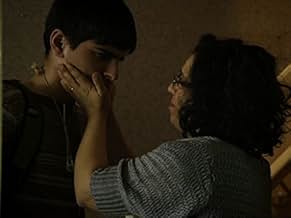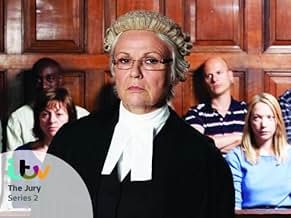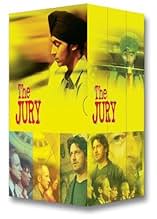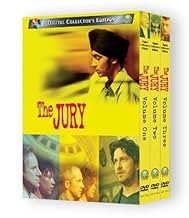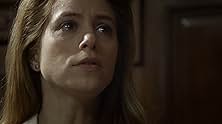IMDb RATING
7.6/10
1.3K
YOUR RATING
Twelve men and women are called for jury service in the retrial of a man accused of a triple murder after the High Court overturns the original verdict.Twelve men and women are called for jury service in the retrial of a man accused of a triple murder after the High Court overturns the original verdict.Twelve men and women are called for jury service in the retrial of a man accused of a triple murder after the High Court overturns the original verdict.
Browse episodes
Featured reviews
This was quite an ambitious undertaking; a six part exploration of not only the dynamics of the jury room but also the effects of the criminal trial on the lives of jurors, their families, the victim's family and the accused and his family.
The jury here is almost perversely diverse, with everyone from a young single black mother to a trainee priest. We follow seven of the jurors home during adjournments and realise that strains and stresses of the jury box and room aren't the half of it. One unlucky juror has a father-in law from hell who wants in on the case. Another is a recovering alcoholic who is finding it hard to stay on the straight and narrow, despite his invaluable `personal trainer' Juror Rose (Helen McCrory) is unlucky enough to be married to a control freak (she took on jury service to get away from him) and to then get friendly with the alcoholic. Juror Jeremy, a down and out businessman, is thrown by an accidental encounter with the man whose sure fire deal nearly ruined him. The trainee priest is having doubts about his vocation and the old lady he befriends finds out she is seriously ill.
The courtroom scenes on the other hand run pretty smoothly (though there is a surprise witness). We have top leading counsel of course, Anthony Sher for the prosecution and Derek Jacobi for the defence, but their performances are so glossy and professional as to be almost boring. The judge is almost invisible, despite a lot of noise from the gallery.
This brings me to two irritating aspects. This being a `racial' killing (Sikh boy accused of killing white schoolboy bully with ceremonial sword) there is a demonstration by both sides outside the Old Bailey every morning and afternoon. I can't believe the police would allow the jurors to be routinely intimidated in this way (though most of them did seem to have other things on their minds.) Surely there is a back door (or they could have bussed them out). Secondly, the practice here in Australia is to `sequester' the jury members ie cut them off from family and friends and anyone else who might try to nobble them after they retire to consider their verdict. We copied this practice from the English. Surely they still sequester the jury at the Old Bailey?
Technical grizzles aside this was a very watchable show with some nice acting. There are weaknesses in some of the plotlines and there's rather a ham-fisted attempt to leave things up in the air at the end, but the film reveals the value of the jury as an institution even if individual jurors might be pretty quirky. To some extent majority verdicts (which we don't have in NSW) iron out some of these, though the storyline here suggests such verdicts have problems of their own.
In the end the jurors do their job conscientiously to the best of their ability, despite all the distractions. Whether they are right or wrong is hardly the point; they represent humanity in the administration of justice, which would be mighty cold and austere without them.
The jury here is almost perversely diverse, with everyone from a young single black mother to a trainee priest. We follow seven of the jurors home during adjournments and realise that strains and stresses of the jury box and room aren't the half of it. One unlucky juror has a father-in law from hell who wants in on the case. Another is a recovering alcoholic who is finding it hard to stay on the straight and narrow, despite his invaluable `personal trainer' Juror Rose (Helen McCrory) is unlucky enough to be married to a control freak (she took on jury service to get away from him) and to then get friendly with the alcoholic. Juror Jeremy, a down and out businessman, is thrown by an accidental encounter with the man whose sure fire deal nearly ruined him. The trainee priest is having doubts about his vocation and the old lady he befriends finds out she is seriously ill.
The courtroom scenes on the other hand run pretty smoothly (though there is a surprise witness). We have top leading counsel of course, Anthony Sher for the prosecution and Derek Jacobi for the defence, but their performances are so glossy and professional as to be almost boring. The judge is almost invisible, despite a lot of noise from the gallery.
This brings me to two irritating aspects. This being a `racial' killing (Sikh boy accused of killing white schoolboy bully with ceremonial sword) there is a demonstration by both sides outside the Old Bailey every morning and afternoon. I can't believe the police would allow the jurors to be routinely intimidated in this way (though most of them did seem to have other things on their minds.) Surely there is a back door (or they could have bussed them out). Secondly, the practice here in Australia is to `sequester' the jury members ie cut them off from family and friends and anyone else who might try to nobble them after they retire to consider their verdict. We copied this practice from the English. Surely they still sequester the jury at the Old Bailey?
Technical grizzles aside this was a very watchable show with some nice acting. There are weaknesses in some of the plotlines and there's rather a ham-fisted attempt to leave things up in the air at the end, but the film reveals the value of the jury as an institution even if individual jurors might be pretty quirky. To some extent majority verdicts (which we don't have in NSW) iron out some of these, though the storyline here suggests such verdicts have problems of their own.
In the end the jurors do their job conscientiously to the best of their ability, despite all the distractions. Whether they are right or wrong is hardly the point; they represent humanity in the administration of justice, which would be mighty cold and austere without them.
Never have you seen such as Gerard Butler portraying Johnny in this film "The Jury". You feel a part of what the character is going through, his turmoil and struggle with being a recovering alcoholic. Gerards performance touched you in ways you could not imagine. Your heart felt for this man and his demons. Mr. Butler was captivating when he performed the scene in which he found out his love interest, Rose was married. You where so awe struck by his pain you could not help but cry for him. This was probably one of the best performances I have ever scene an actor do in any film. If this is what we seen what is there coming? I eagerly wait for Mr. Butler to dazzle us all. Butphan
I set out to watch this 6 hour British mini series for one reason: I'm a huge fan of Gerard Butler's. I came away amazed at how really good I thought it was. The mini-series deals with the trial of a Sikh student accused of brutally killing a fellow student (and compelling evidence both for and against). And while it does indeed explore the trial itself, the beauty of this series is the exploration of the jurors and their lives (something rarely done). It takes 7 of the 12 jurors and shows what is going on in their lives (and by proxy, what their lives the last several years must have been like). You have the alcoholic just out of rehab the first morning of the trial (Butler), the single mother with her own "mom" issues, the seminary student torn between his love of God and his love of a woman, the old Catholic woman who is clearly lonely, the man who had lost his fortune a while back and is no longer financially well-off, the woman who is controlled by her ex-military and semi-crippled husband and last the responsible citizen who is pleased and overwhelmed at the duty placed on him (and who has the most clueless in-laws). You have the not-so-nice prosecutor (played admirably by Antony Sher) and the decent defense barrister (played well as always by Derek Jacobi). Almost all the characters are to some degree stereotypes, but it is how the actors portray them and the way they are written--the way these stories unfold--that is so special. These performances are just truly wonderful (notably Butler and the actors portraying the abused wife, the single mom and the duty bound juror) The ultimate outcome of the trial, while important, takes second place to the jurors' outcome and the central question: how difficult is it to reach a decision on guilt or innocence when you can NEVER really know?
STAR RATING:*****Unmissable****Very Good***Okay**You Could Go Out For A Meal Instead*Avoid At All Costs
Kudos to ITV for the good idea of this six-parter series,which shows we can do it and that it's not just Hollywood that can make this kind of thing work.
In Britain (and certain other countries) it's considered every working citizens duty to perform 'jury service'.That is,twelve people (men and women usually these days) from completely different walks of life and with presumably no previous experience of the judicial system must come together to decide the fate of a defendant on trial for a crime.In this case,a 15/16 year old Pakistani student has been accused of hacking his classmate to death in a field.It is a very high profile case which has ignited racial hatred between the White/Asian community,and the series cleverly examines not only the opinions of the jurors,but also how this alien and stressful experience affects their lives outside work.
The acting is pretty good stuff.Veteran Derek Jackobi is lively,spirited and ingenuitive as the defence barrister.Plus Anthony Sher is suitably cold and uncompromising as the prosecution.The people on the jury impressively convey the uncertainty and fear that overrides them all.Jack Shepherd is a good character actor,here playing the murdered boy's father,but is given little to do except sit in the courtroom looking tense and agitated.Also,Tim Healy gets to spread his wings and fly in something that isn't another annoying Uno advert.
The ending is something of a cop-out ,with a few unexplained matters not being resolved.But it's all acted with such sincerity and dash,with engaging pace and dialogue to match,that you feel compelled to watch it to the end if only to support British big/small screen productions.***
Kudos to ITV for the good idea of this six-parter series,which shows we can do it and that it's not just Hollywood that can make this kind of thing work.
In Britain (and certain other countries) it's considered every working citizens duty to perform 'jury service'.That is,twelve people (men and women usually these days) from completely different walks of life and with presumably no previous experience of the judicial system must come together to decide the fate of a defendant on trial for a crime.In this case,a 15/16 year old Pakistani student has been accused of hacking his classmate to death in a field.It is a very high profile case which has ignited racial hatred between the White/Asian community,and the series cleverly examines not only the opinions of the jurors,but also how this alien and stressful experience affects their lives outside work.
The acting is pretty good stuff.Veteran Derek Jackobi is lively,spirited and ingenuitive as the defence barrister.Plus Anthony Sher is suitably cold and uncompromising as the prosecution.The people on the jury impressively convey the uncertainty and fear that overrides them all.Jack Shepherd is a good character actor,here playing the murdered boy's father,but is given little to do except sit in the courtroom looking tense and agitated.Also,Tim Healy gets to spread his wings and fly in something that isn't another annoying Uno advert.
The ending is something of a cop-out ,with a few unexplained matters not being resolved.But it's all acted with such sincerity and dash,with engaging pace and dialogue to match,that you feel compelled to watch it to the end if only to support British big/small screen productions.***
OK, I'm American, not a Brit. But would the judge really allow the yobbos in the gallery to continue to yell and harass the defendant? Certainly in this country, the initial offender would be banned from the courtroom, and if the disturbance continued, the gallery would be cleared.
And do jurors in a high-profile case really walk out of the courthouse in front of protesters? They go home at night rather than being sequestered, and they are allowed to read newspapers and listen to news reports about the trial?
The individual stories of the jurors are interesting, but the ridiculous portrayal of the courtroom ruins it for me.
And do jurors in a high-profile case really walk out of the courthouse in front of protesters? They go home at night rather than being sequestered, and they are allowed to read newspapers and listen to news reports about the trial?
The individual stories of the jurors are interesting, but the ridiculous portrayal of the courtroom ruins it for me.
Did you know
- TriviaIn season one, episode one, a computer screen list showing the names of potential jury members contains the names of fourteen characters from The Bill (1984). They are Reg Hollis, Nick Klein, Duncan Lennox, Debbie McAllister, Jack Meadows, Andrew Monroe, Dave Quinnan, Kass Rickman, Paul Riley, Vic Singh, Kate Spears, Roz Clarke, Tony Stamp, and Des Taviner. Some of the potential jurors' addresses also correspond to street names used on the show.
- ConnectionsFeatured in The Jury: The Jurors (2011)
- How many seasons does The Jury have?Powered by Alexa
Details
Contribute to this page
Suggest an edit or add missing content



